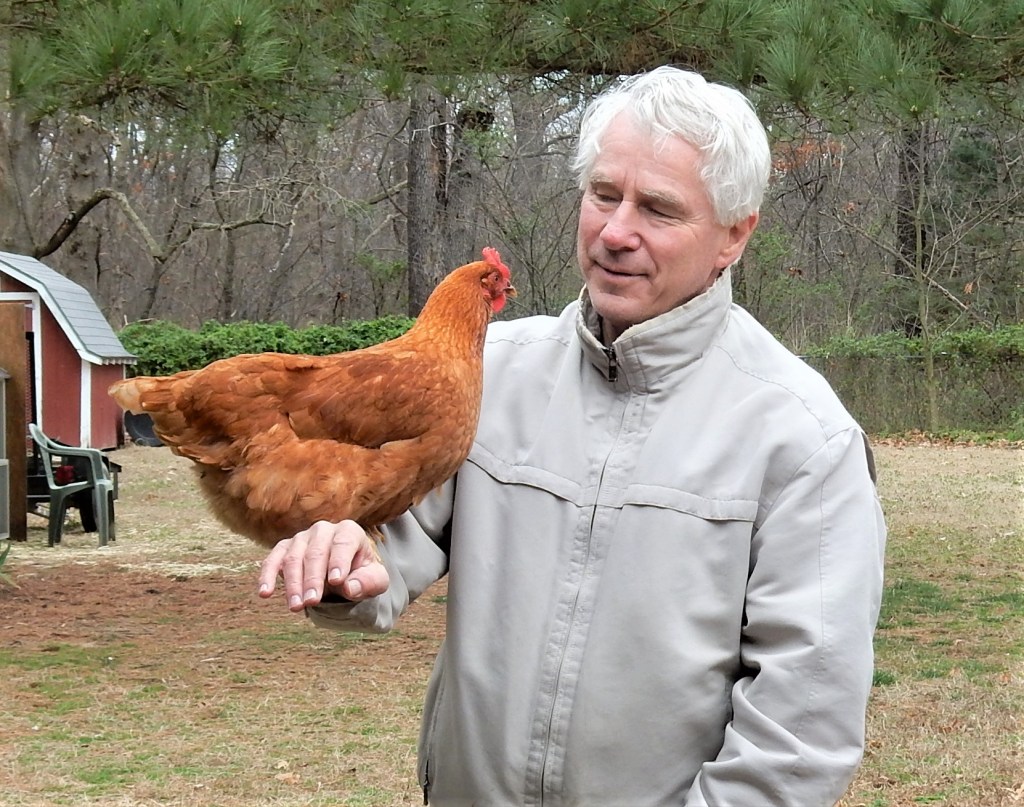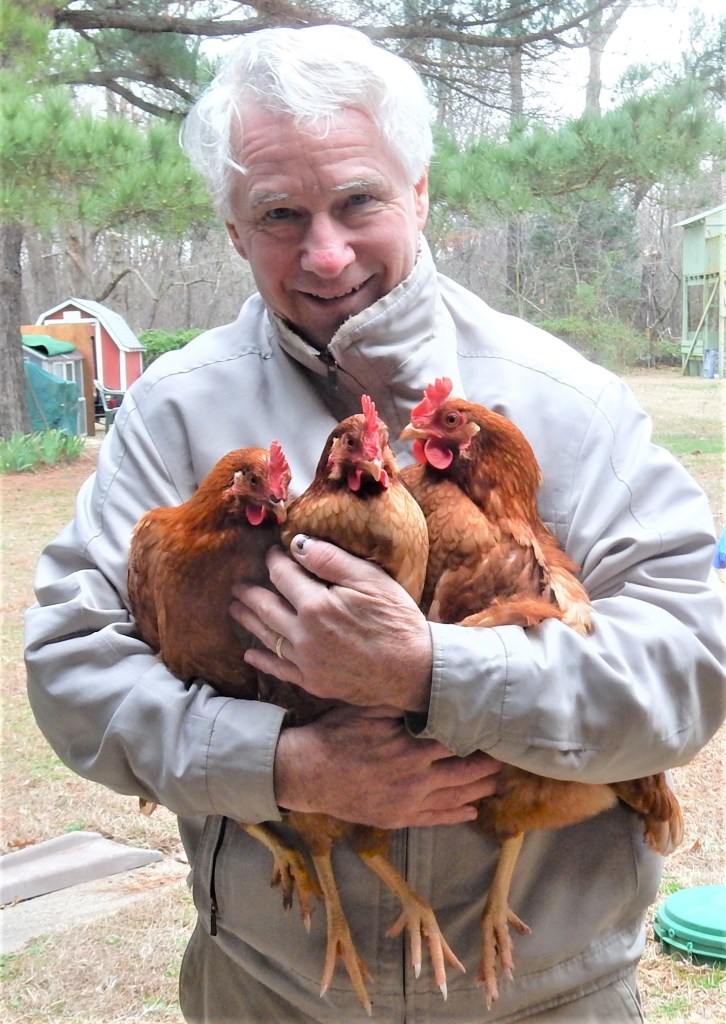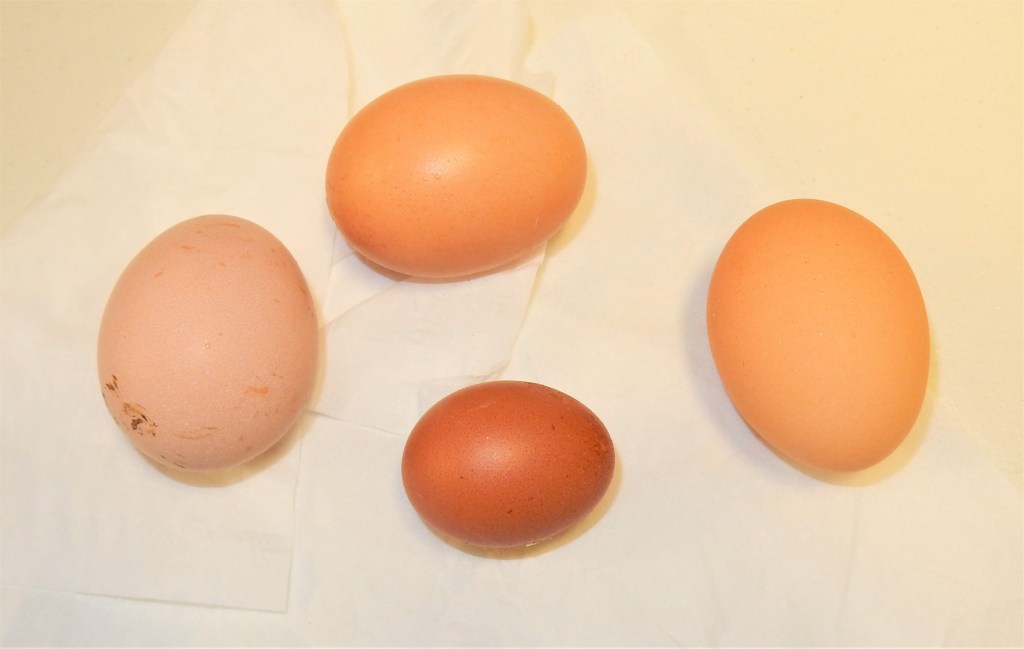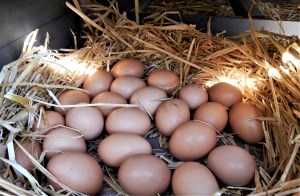Two of my chickens don’t like to be picked up, but something was different today.
I prepared their mix of goodies which consists of whole-grained rolled-oats, dried meal worms, cut-up apples, bread bits, and scratch. Water and the 16% protein meal called Crumbles are available 24/7.

As I tossed the mix out for them, Elona and Baby wanted to be picked up. These two, and Goldie, are the ones who always want to be loved on. I picked up Baby, then Elona. But this time, Whitey and Red Head came up. That’s unusual because they are the more elusive ones.
As I held and talked with Elona – she was explaining life to me – Whitey stood at my feet.
“You want up, Whitey?” She took a step closer.
I put Elona down and scooped up Whitey. She cocked her head, looked at me from both sides of her head, and talked – but not freely as do Baby, Elona, and Goldie. They chatter with me, but Whitey merely said a few syllables. (I’m not joking.)
Then Goldie walked up and began pecking on my britches. That’s her signal to pick her up. Elona does that, too.
I put Whitey down and scooped up Goldie, and she began telling me what she’s been doing lately. I then felt Red Head bump against me as she was looking for more worms. I put Goldie down and picked up Red Head.

She squirmed a bit but didn’t try to get away. However, she wouldn’t talk at all. Red Head merely looked at me as if to say, “Are you happy now that I let you pick me up?” When she looked at the ground and wiggled her legs, I put her down, and she continued her search for worms. I had an extra worm in my hands, so I said, “Red Head – you want this?”
Without hesitation she jumped up, and with outstretched neck grabbed it with her beak. At that movement, the others came running. They wanted it! Do you know the chicken’s philosophy of life? Here it is: If I have it, it’s mine. If you have it, it’s mine. And if I had it but you took it, it’s still mine!
So, I threw out another handful of dried meal worms; that generated another feeding-frenzy.

I often hold all five of the chickens – no more than three at a time, of course. I watch over my flock because (this may sound strange) I love them. I care for them and feed them very well. After losing the rooster (Fred) because I forgot to lock the coop, I always make sure they are safe and secure at night. They, in turn, come running to me every time I go out the back door. Again, as strange as it sounds, these babies love me – at least, as much as chickens know how to love.
Do you know that God loves us and wants to take care of us? But He does much more than I can do for my birds. I watch over my flock on a limited scale at best, but our Creator-Savior is a good shepherd and watches over His flock 24/7. He knows what’s happening with us every second of the day. He desires to “hold us” and care for us, and He goes out of His way to keep us safe and secure – if we let Him.
Amazingly, God is also limited in what He can do for us. What’s the limitation?
We are the limiting factor.
If my chickens wanted to, they could fly over the fence and escape my protective, nurturing care. They would be independent to roam freely. But they don’t. They stay with me, they trust me, they’re secure with me.
But many humans don’t have the wisdom my chickens have, and they run from God. Desiring independence, they “fly over the fence.” They fly from safety and into danger. They run from plenty, and into poverty. That’s not wise.

John 14:21 tells us that whoever loves the Lord – those who listen to and obey Him – are the ones to whom God the Father will reveal Himself.
If we run to God, and remain in His protective care, we can receive the “mix of goodies” that He wants to give us – in addition to His sustaining care available 24/7.
God loves you and desires to communicate with you. Study the Bible, learn to know Jesus, and find your security in and with Him. You may be surprised at the results.





 Chickens are curious creatures: they want to get into everything, fly over anything their limited flight ability will allow, and go where no chicken has gone before. But while they will run from a person who is trying to catch them, and run from another animal coming at them, their little minds cannot understand the inherent danger involved in leaving the protection established by their keeper.
Chickens are curious creatures: they want to get into everything, fly over anything their limited flight ability will allow, and go where no chicken has gone before. But while they will run from a person who is trying to catch them, and run from another animal coming at them, their little minds cannot understand the inherent danger involved in leaving the protection established by their keeper. with each other, eat more, cluck to their heart’s content, and enjoy life. So why do they spend an inordinate amount of time at the gate looking out? Within the yard, they have all they will ever need. They are safe from all kinds of predators … and cars. Yet with their half-inch-long brain, there is no way they can understand the dangers outside the fold. Neither safety nor danger enters their little minds, so they roam wherever they feel like it at the moment.
with each other, eat more, cluck to their heart’s content, and enjoy life. So why do they spend an inordinate amount of time at the gate looking out? Within the yard, they have all they will ever need. They are safe from all kinds of predators … and cars. Yet with their half-inch-long brain, there is no way they can understand the dangers outside the fold. Neither safety nor danger enters their little minds, so they roam wherever they feel like it at the moment. Wisdom enables us to see through problematic situations; to understand and heal wounded relationships; to formulate a plan of action. Wisdom enables us to avoid hurting others and helps us to understand and love more completely. Wisdom enables us to accomplish our God-given goals. Wisdom helps us to understand Who God, what He desires of us, and to obey Him. As we remain obedient to the Lord, He grants us wisdom to understand and enjoy life.
Wisdom enables us to see through problematic situations; to understand and heal wounded relationships; to formulate a plan of action. Wisdom enables us to avoid hurting others and helps us to understand and love more completely. Wisdom enables us to accomplish our God-given goals. Wisdom helps us to understand Who God, what He desires of us, and to obey Him. As we remain obedient to the Lord, He grants us wisdom to understand and enjoy life.
 I’ve noticed that the birds often gather at the fence and look in the direction of the kitchen window. When I move around in the room, their heads follow my movements and they seem to be waiting for me to come out. But when they are standing in bright daylight, how can they see me through a window in a room with subdued lighting?
I’ve noticed that the birds often gather at the fence and look in the direction of the kitchen window. When I move around in the room, their heads follow my movements and they seem to be waiting for me to come out. But when they are standing in bright daylight, how can they see me through a window in a room with subdued lighting? differently. Choosing to raise her own offspring, some females either break or eject foreign eggs from her nest.
differently. Choosing to raise her own offspring, some females either break or eject foreign eggs from her nest. Matshona Dhliwayo – is: “The Universe is one body; love is its heartbeat.” Not understanding either the universe or love, Dhliwayo is wrong on both counts.
Matshona Dhliwayo – is: “The Universe is one body; love is its heartbeat.” Not understanding either the universe or love, Dhliwayo is wrong on both counts. Normally when I walk out the back door of the house, the four hens come running to me. They think I’ll have a treat for them, and they are usually correct. So, they run to me, stand as tall as they can, and sometimes jump as they try to get goodies out of my hands. One time I put my open hand down to their level. When they saw the wheat kernels in the palm of my hand, they rushed forward. As they began eating it, I found out what it feels like to be hen-pecked. (No, it didn’t hurt at all.) By the way, chickens have a 300-degree field of vision without turning their heads.
Normally when I walk out the back door of the house, the four hens come running to me. They think I’ll have a treat for them, and they are usually correct. So, they run to me, stand as tall as they can, and sometimes jump as they try to get goodies out of my hands. One time I put my open hand down to their level. When they saw the wheat kernels in the palm of my hand, they rushed forward. As they began eating it, I found out what it feels like to be hen-pecked. (No, it didn’t hurt at all.) By the way, chickens have a 300-degree field of vision without turning their heads. we love God for what He does for us? We don’t have to look far to see His blessings. In fact, if we don’t see them, we are blind because God’s blessings are so abundant and prevalent.
we love God for what He does for us? We don’t have to look far to see His blessings. In fact, if we don’t see them, we are blind because God’s blessings are so abundant and prevalent. If we are purposely doing something – thought, word, or deed – that is contrary to Biblical principles, we will not have the Joy of the Lord. Could that apply to you?
If we are purposely doing something – thought, word, or deed – that is contrary to Biblical principles, we will not have the Joy of the Lord. Could that apply to you?